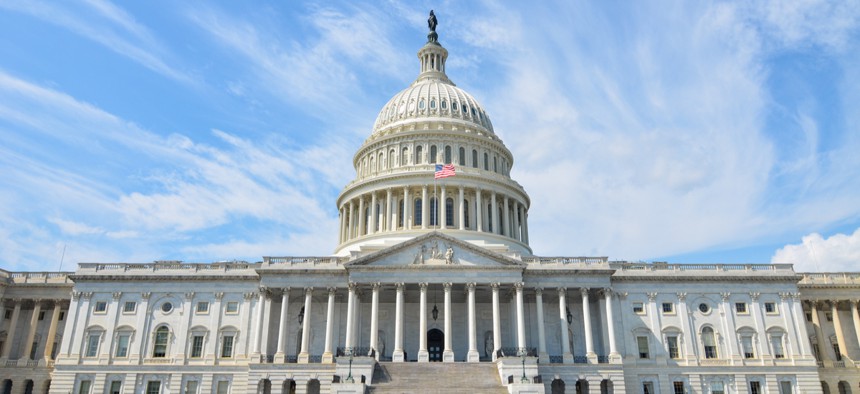House Passes Bills to Boost Emerging Tech and Shore Up Cybersecurity of Electric Sector

Orhan Cam/Shutterstock.com
Lawmakers are calling for significant research and development efforts.
A batch of bills aimed at improving the cybersecurity and reliability of the energy sector and informing the United States’ use of emerging technologies, such as blockchain and quantum computing, passed the House Tuesday and now head to the Senate for consideration.
Here’s a rundown on what the bills do.
Grid Security Research and Development Act
With this bill, Reps. Ami Bera, D-Calif. and Randall Weber, R-Texas, propose that Congress put over $800 million within the next five years toward developing tools and resources to strengthen the cybersecurity and reliability of the electric grid. The legislation is meant to make the energy sector more resilient to cyberattacks and physical impacts associated with climate change, such as the recent wildfires on the West Coast.
It calls on the secretary of Energy to establish research and development plans working with the National Science Foundation and the Department of Homeland Security’s Science and Technology Directorate, and create a list of best practices working with the National Institute of Standards and Technology.
The bill authorizes the secretary to issue grants to a range of entities, including academic institutions and private companies as part of the plans.
Other Energy Bills
The chair and ranking member of the House Energy and Commerce Committee supported three bills aimed at improving the cybersecurity of the grid by directing the Energy Secretary to increase collaboration with the private sector, create a program to test equipment used in the bulk power system, and to empower an assistant secretary to play a greater role in cybersecurity.
But tasks outlined in the legislation are arguably the jurisdiction of the Homeland Security and Governmental Affairs Committee, as that committee’s chairman, Rep. Bennie Thompson, D-Miss., pointed out on the House floor.
“I’m concerned that without clarification these bills risk significantly disrupting how the federal government has collaborated regarding cybersecurity for nearly two decades,” he said. “Congress has repeatedly supported a framework that designates the Department of Homeland Security as the lead for ensuring the federal agencies work together and with the private sector to protect and secure critical infrastructure.”
COMPETE Act
Introduced in August by Reps. Cathy McMorris Rodgers, R-Wash., and Bobby Rush, D-Ill., the American Competitiveness on More Productive Emerging Tech Economy, or COMPETE Act, would direct the Commerce Department and Federal Trade Commission to dive deep into the ways in which America is harnessing and governing several burgeoning technologies.
Nine other previously proposed bills intending to advance Congress’ grasp of the nation’s broader tech ecosystem make up the text of COMPETE.
Its ultimate passage would require new research steered by the two agencies into confronting “online harms,” and boosting 3D printing, the internet of things, IoT in manufacturing, artificial intelligence, quantum computing, blockchain, new and advanced materials and unmanned delivery services—all trendy, on-the-rise tech right now.
“Today’s vote marks an important step forward in maintaining the United States’ lead on the technologies of the future,” Rush said in a statement Tuesday. “In passing this bill, the House has made a statement about the value it places on these emerging technologies and how we can use them to help people across the country.”
The 36-page legislation would mandate year-long, agency-led investigations into each of those listed tech-focused areas, and it incorporates explicit instructions regarding the sorts of information those leading the studies would need to report back to Congress. On top of recommendations for policies and legislation that would “advance the expeditious adoption” of the technologies being pursued, by the end of the process, Congress would also want full lists of public-private partnerships promoting the different tech’s adoption, more details on near- and long-term risks among supply chains—and much more.
“In order for America to win the future, beat China, create jobs, and raise our standard of living, we need to lead the world in emerging technologies,” McMorris Rodgers said.
Consumer Safety Technology Act
H.R. 8128, originally called the “AI for Consumer Product Safety Act” when it was first introduced by Reps. Jerry McNerney, D-Calif., and Michael Burgess, R-Texas earlier this year, initially aimed to catalyze a pilot program backed by the Consumer Product Safety Commission that would tap artificial intelligence to push forward certain elements of consumer safety.
The House Committee on Energy and Commerce recently passed the bill by voice vote, with an amendment in the nature of a substitute that switched the title of it to the “Consumer Safety Technology Act,”—and added in text based on the Blockchain Innovation Act and the Digital Taxonomy Act, both previously put forth by Rep. Darren Soto, D-Fla.
With requirements of that AI-driving pilot program and those two bills included, the legislation that passed Tuesday would also push the Commerce Department and Federal Trade Commission to “conduct a study on current and potential use of blockchain technology in commerce and the potential benefits of blockchain technology for limiting fraud and other unfair and deceptive acts and practices,” within a year of its passage.
Soto recently told Nextgov the ultimate goal of that work would ideally lead to the launch of a Commerce Department-led blockchain center of excellence.
Blockchain refers to a digital and decentralized, public ledger for authenticating transactions and it is generally associated with cryptocurrencies it underpins. With those in mind, another feature of the bill would also call on the FTC to look deep into—and create a report for Congress on—all the moves it's made to date regarding “unfair or deceptive acts or practices in transactions relating to digital tokens.”
A statement from Soto Tuesday states that the legislation encompasses the first blockchain bills to pass the House.





